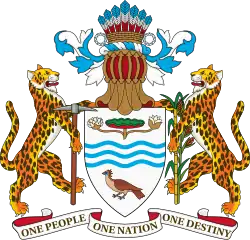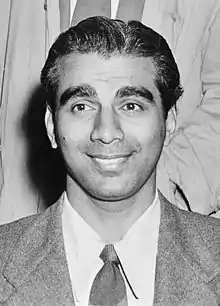1953 British Guiana general election
General elections were held in British Guiana on 27 April 1953.[1] They were the first held under universal suffrage and resulted in a victory for the People's Progressive Party (PPP), which won 18 of the 24 seats in the new House of Assembly. Its leader, Cheddi Jagan, became Prime Minister.[1]
| |||||||||||||||||||||||||
24 (of the 28) seats in the House of Assembly 15 seats needed for a majority | |||||||||||||||||||||||||
|---|---|---|---|---|---|---|---|---|---|---|---|---|---|---|---|---|---|---|---|---|---|---|---|---|---|
| Registered | 208.939 | ||||||||||||||||||||||||
| Turnout | 156.226 (74.77%) | ||||||||||||||||||||||||
| |||||||||||||||||||||||||
| |||||||||||||||||||||||||
 |
|---|
| This article is part of a series on the politics and government of Guyana |
| Constitution |
|
|
Electoral system
Constitutional reforms as a result of the Waddington Commission had led to the creation of the House of Assembly to replace the Legislative Council. The new House had 28 members; 24 members elected in single member constituencies, a speaker appointed by the Governor and three ex officio members (the Chief Secretary, the Attorney General and the Financial Secretary).[2]
Campaign
The PPP ran candidates in 22 of the 24 constituencies, failing to contest the two interior constituencies due to a lack of money. The National Democratic Party contested 15 constituencies and the People's National Party eight.[3] A total of 85 independents,[4] including four United Guiana Party candidates, also contested the elections.[3] The United Workers and Farmers Party did run as a party, but contested some seats as independents.[3]
Results
| Party | Votes | % | Seats |
|---|---|---|---|
| People's Progressive Party | 77,695 | 51.04 | 18 |
| National Democratic Party | 20,032 | 13.16 | 2 |
| People's National Party | 3,000 | 1.97 | 0 |
| Independents | 51,504 | 33.83 | 4 |
| Invalid/blank votes | 3,995 | – | – |
| Total | 156,226 | 100 | 24 |
| Registered voters/turnout | 208,939 | 74.77 | – |
| Source: GECOM | |||
Elected members
| Constituency | Member | Party | Notes |
|---|---|---|---|
| 1 – North West | William Alfred Phang | Independent | |
| 2 – Pomeroon | Thomas Sherwood Wheating | Independent | |
| 3 – Western Essequibo | Janet Jagan | People's Progressive Party | Deputy Speaker |
| 4 – Essequibo Islands | Theophilus Lee | Independent | |
| 5 – Bartica and Interior | Eugene Francis Correia | National Democratic Party | |
| 6 – Demerara-Essequibo | Fred Bowman | People's Progressive Party | |
| 7 – West Bank Demerara | Jai Narine Singh | People's Progressive Party | Minister of Local Government and Social Welfare |
| 8 – East Bank Demerara | Joseph Prayag Lachhmansingh | People's Progressive Party | Minister of Health and Housing |
| 9 – Upper Demerara River | Charles Albert Carter | Independent | |
| 10 – Georgetown South | Ashton Chase | People's Progressive Party | Minister of Labour, Industry and Commerce |
| 11 – Georgetown South Central | Clinton Reginald Wong | People's Progressive Party | |
| 12 – Georgetown Central | Jessie Burnham | People's Progressive Party | |
| 13 – Georgetown North | Frank Obermuller van Sertima | People's Progressive Party | |
| 14 – Georgetown North-East | Forbes Burnham | People's Progressive Party | Minister of Education |
| 15 – West Central Demerara | Ram Karran | People's Progressive Party | |
| 16 – Central Demerara | Sydney Evanson King | People's Progressive Party | Minister of Communications and Works |
| 17 – East Central Demerara | Jane Phillips-Gay | People's Progressive Party | |
| 18 – Mahaica-Mahaicony | Chandra Sama Persaud | People's Progressive Party | |
| 19 – Western Berbice | Samuel Mahabali Latchmansingh | People's Progressive Party | |
| 20 – New Amsterdam | Rudy Kendall | National Democratic Party | |
| 21 – Berbice River | Ajodha Singh | People's Progressive Party | |
| 22 – Eastern Berbice | Robert Stanley Hanoman Singh | People's Progressive Party | |
| 23 – Corentyne Coast | Cheddi Jagan | People's Progressive Party | Leader of the House and Minister of Agriculture, Forests, Lands and Mines |
| 24 – Corentyne River | Mohamed Khan | People's Progressive Party |
Aftermath
After assuming power Jagan embarked on implementing a series of policies that involved radical social reform, mainly directed at the colonial oligarchy. The British colonial authorities sent in troops in response to the alleged threat of a Marxist revolution. Governor Alfred Savage suspended the constitution in October (only 133 days after it had come into force) and set up a transitional government of conservative politicians, businessmen and civil servants.[1] Writing in The Guardian in 2020, Gaiutra Bahadur said that "the overthrow of Guyana’s ruling party by colonial forces fomented a racial divide that continues to blight its politics", saying that there was a greater crackdown on the Afro-Guyanese than on the Indo-Guyanese, in a deliberate and successful attempt to divide the PPP.[5]
References
- Nohlen, D (2005) Elections in the Americas: A data handbook, Volume I, p354 ISBN 978-0-19-928357-6
- Historical information events and dates on the Parliament of Guyana from 1718 to 2006 Parliament of Guyana
- The election campaign in 1953 Guyana News and Information
- 1953 Election Archived 2016-06-16 at the Wayback Machine GECOM
- "In 1953, Britain openly removed an elected government, with tragic consequences | Gaiutra Bahadur". the Guardian. October 30, 2020.

